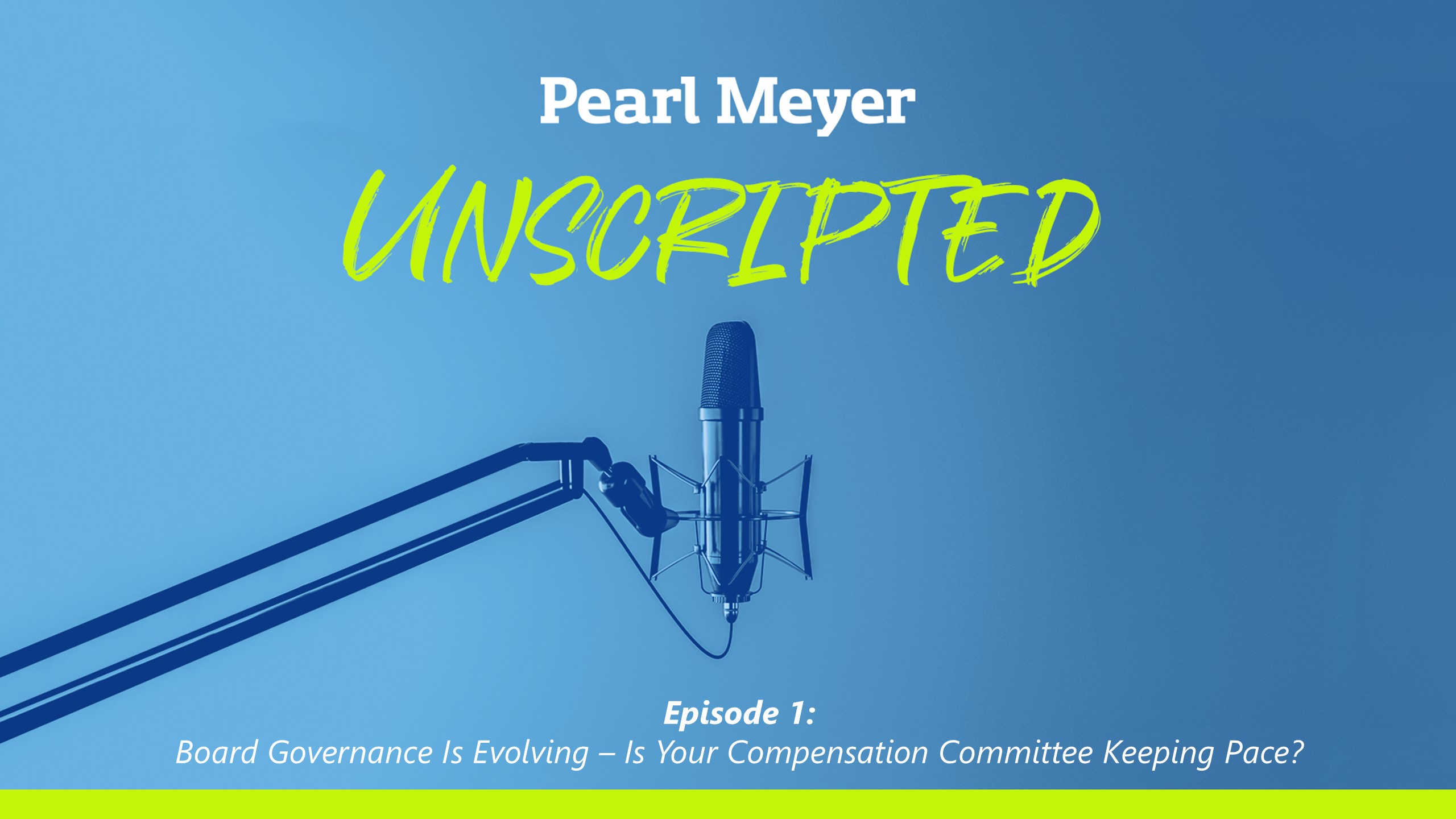
Podcast | Sep 2025 | The Pearl Meyer Unscripted Podcast
Board Governance Is Evolving – Is Your Compensation Committee Keeping Pace?
S2 Ep1: The evolving purview of the compensation committee and the implications of expanding governance responsibilities.
Transcript
Jake: Is your board's compensation committee staying current with the evolving governance landscape? And does the committee's name accurately represent its purview?... Welcome to season 2 of Pearl Meyer Unscripted, and thanks for listening. I'm Jake George, CMO at Pearl Meyer, and this season we're focused on what hot topics are on the minds of the comp committee as they head into their fall meetings.
Our senior executive compensation consultants from season 1, Mark Rosen and Aalap Shah, are back, and this time they're bringing some of their colleagues into the conversation to delve into each topic.
In this first episode, Matt Turner, Pearl Meyer's President of Executive Compensation, joins them to discuss the evolving purview of the compensation committee and the implications of expanding governance responsibilities. Let's listen.
Aalap: Hey, Mark.
Mark: Hey, how's it going?
Aalap: Good. I've got a question for you. I just came out of a comp committee meeting and we were doing our annual charter review and it was a bit ho-hum and I left the meeting thinking like, it seems like I should be saying more about the charter. You know, frankly, the client really just, you know, moved a comma and the committee approved it. So, I mean, are you seeing that at all with any of your clients?
Mark: Yeah, I just did the same thing this last month on a couple clients. Seems like we're just checking the box, 'Yeah, we reviewed the charter.' But there's so much more going on. And so that's why I've asked Matt Turner, one of our partners, to join us today. Because he's been spending a lot of time thinking about this issue. Welcome, Matt.
Matt: Hey, how's it going guys?
Aalap: Hey Matt, how are you? And good idea, Mark.
So Matt, so let me ask you. Did a charter review, it was pretty ho-hum and just seems like we should be talking more about it. I mean, can you give me the lay of the land of what's going on?
Matt: Yeah, I've had that same experience with clients as well. What's going on, I think, is over the past 10 years or so, we've seen an expansion of the presumed responsibilities of corporate governance. This is for the board in general, but it's probably most significant for the compensation committee. And probably should say the committee formerly known as compensation, with apologies to Prince, because that is changing.
But I say presumed responsibilities because there hasn't been this big, explicit, concrete legal requirement that's come out. But this expansion seems to be driven by broader social trends. We started to see an increase in focus on stakeholders in general, as opposed to simply focused on shareholders. We have the "Me Too" movement surging and overall increased social awareness of racial disparities in multiple aspects of public life and continuing through the COVID epidemic that really kind of changed how we thought about how we interact in our workplaces. So a lot of big social trends, driving broader thinking about corporate governance in America.
Mark: So, is corporate America just expanding their board and committee charters?
Matt: Well, not really. It's not like yesterday it was X and today it's X-plus. There's been kind of a gradual change. With a lot of things, we saw the same thing, where we saw some early adapters, usually larger high profile public companies, typically in industries or in a sector that's more sensitive to social trends or their client bases. And then over time, kind of a second slower wave of more companies feeling like they're seeing some new best practices and emerging trends and that those trends are demanding an expansion of what the company is overseeing. And oftentimes we saw companies renaming their committees before the board or the committees or the management team actually prepared for those expanded agendas. And so, we had the whole, let's not have the 'tail wag the dog' conversations with clients five, six, seven years ago and saying, let's step back and rethink who's going to be responsible for what. What does belong in the overall set of things that the board is responsible for and what things are going to land on this committee in particular? And then we can think about what's the right name for the committee. And even beyond that, how do we fit these new things into the committee? How do we make sure that the committee is fully prepared to address these items? Put them in the charter, they're more explicitly responsible for these things, so we better be ready for that.
Mark: So, what sort of things are we talking about here? What new responsibilities are you seeing in the committee charter, specifically the compensation committee?
Matt: Yeah, the more common things we've seen showing up involve succession planning. And this is expanded succession planning beyond simply, coming together every five, six, seven years to deal with CEO turnover, but going deeper, looking more at the C-suite and even levels below that. Workforce culture or company culture, ESG (Environment, Social, and Governance responsibilities.) And this of course includes things like DE&I. Talent strategy deep in the organization and thinking about broader HR issues below the reviewed executive level. And this could include things like pay equity, understanding how the company's doing in terms of pay between male and female, or Caucasian versus minority deep in the organization. And these can be pretty involved studies that the committee's reviewing. And so, committees are going deeper on these topics, succession planning, talent strategy than they traditionally have. That involves more time.
Aalap: It occurs to me Matt that some companies have made the jump to change their name from compensation committee to human resources or talent management committee, things like that, but they actually haven't changed anything in their charter. Do you advise that they should enumerate some of these items in their charter?
Matt: Yeah, I think it's a really good idea. Once you change the name of the committee, that's something that gets noticed in the outside world. And they're immediately going to look for what's different. If you say you're responsible for something, but you haven't gone to the next step of making sure that the committee calendar and cadence, the agenda, include the explicit review or time to discuss with management or outside experts around those topics, you're really kind of leaving a hole in terms of the gap between stated responsibilities and the responsibilities that are actually being fulfilled by the committee. So we really do advise to kind of flip around the order of things. Think about what this committee needs to be responsible for. What are the resources and what is the time it needs to make sure it can fulfill those responsibilities. Then put those things into the charter and then change the committee name if it's appropriate.
Aalap: Got it. I mean, one thing that occurs to me is that we are talking about potential expansion of responsibilities. And as we all know, directors already have a lot on their plate. So, if I'm thinking about this conversation in the boardroom, I think there's probably going to be a healthy debate is that, does this dilute our focus as a committee? Or does it strengthen the overall board governance? What are your thoughts?
Matt: I think it actually does both. It brings up the point that there's a lot of good to come about from this movement, but there's also increased risk involved in trying to make sure that the committee is fulfilling it. So yeah, there are more responsibilities landing on the committee's table.
And if we don't change the amount of time and attention that the committee spends on its slate of responsibilities, then we are diluting the amount of time and attention that goes to any particular item on the agenda. So we have all the core responsibilities that the committee has always had responsibility for, and we're adding two or three, in some cases maybe four pretty significant responsibilities to their charter. What does that mean? It means, maybe there's more meeting time that is needed. So an hour meeting now goes to 75 minutes or 90 minutes. Maybe instead of four or five meetings in a year, it's five or six meetings in a year. Or maybe it's really, and this is what we advise a lot of our clients to do, is let's step back and rethink who's doing what, not just with the committee, but with the broader board. It could be that some things the committee has had on its agenda could move to other committees or back to the full board.
One example here is director compensation. We've seen over the years that more often than not director compensation is handled by the compensation committee, but in quite a few companies, it's handled at the nom-gov committee. Well, some companies might see that maybe it makes sense to shift it to the nom-gov committee to make room for some other things on the comp committee's agenda. It could be that maybe some things that the committee is responsible for they do get narrowed in terms of the amount of time in the meeting that is spent on them. It could be there are more consent agenda items. More read ahead. As one committee member put it to me, "more homework," it's like you're taking APUSH, AP-US history in high school again. So, there's two to three hours of homework each week in terms of what we're doing for the committee. So, it is clear that the amount of time and attention that these committee members in particular are spending on their responsibilities is increasing. I think that boards and committees need to put a little more thought into how are we using the time when we're together, that 60, 75, 90 minutes we're together, what's the best use of that time?
Mark: Yeah, I think we need to be very careful about recommending that anybody expands their board books. There's already enough homework prior to the meeting, but I've got quite a few clients that use a consent agenda with the materials already, so it's a great idea for companies that haven't. And by looking at the agenda, which of course is result of what the charter is, you can identify where that makes sense.
Matt: Yeah.
Mark: But Matt, are all companies expanding their charters and has everybody done it? If you haven't done it, do they face any risks? Is there any legal requirement to do so?
Matt: Let's start with that first question. Have all companies done this? And at this point, no. You guys probably have the same experience. I've got some clients that, under the guise of they don't want to be the tall blade of grass. And there's a lot of merit to that sentiment have been slow walking this expansion of committees agreement. And that's okay. I think that not every company needs to do everything at the same pace. A lot of companies have been very slow to move on this expansion.
But I do think it's inevitable that these responsibilities are going to result in some expansion, even for companies that have been more conservative on this front. And so we will see over time, whereas we saw, just to take it as a benchmark, the number of companies that have renamed their committee from something other than compensation committee really expanded quite a bit over the past five or six years. For large cap companies that went from a 30-35% to close to 70% have something beyond compensation committee in their names these days. And smaller companies, it's a smaller percentage of companies, a smaller majority, but it is still the majority of companies that have expanded that committee name. That means though that there are still companies that are still simply the compensation committee. But even with that same name, these responsibilities are upon us. And so I think companies will need to pay attention and expand what they're doing.
And I do think there's some risks, Mark. You can't simply say, well, we haven't expanded our charter. Therefore, these items that don't appear in our charter, they're not our responsibility. We all remember what happened with Wells Fargo. It was about 10-12 years ago when there was a case of unintended incentives deep in the organization where employees had incentives to expand the relationships with clients and that led to aggressive cross-selling, and in some cases, cross-selling that maybe was beyond what customers had intended. It was a bit of an embarrassing situation for Wells Fargo and more to the point here, while this particular oversight was not part of the explicit charter for the compensation committee, there was still risk and there was still concerns about board reputation, it really echoed through the organization. So, whether or not things are in your charter, there are presumptions in the outside world that the board has oversight for certain things, certain things that it probably didn't have those presumptions, you know, 10, 15, 20 years ago. So, it's time to pay attention.
Aalap: Yeah, definitely. I don't think the fiduciary responsibility stops at the enumeration of what's in the charter. But speaking of risk, are there specific things the committee can do to stay on top of managing that risk?
Matt: Yeah, there are, and I think my favorite thing is a real concrete thing. Every public company today has to go through a risk review, a compensation risk review.
And as you guys know, this typically covers those core responsibilities. It's really focused on incentive compensation design, employee contracts, treatment of compensation in the event of severance and change of control, all the stuff that, kind of the blocking and tackling that we've been doing with our clients. But I have found that including these expanded responsibilities into the risk review can be really helpful. With a lot of clients, I put a module into the risk review around talent management and company culture so that there's a whole slate of audit questions we go through with the management team to make sure that the risk review includes all of these new items. And an interesting case in point, last year we had this put in for the first time with a client. In fact, this was a client that was newly public. It was one of seven modules in the risk review to look at talent management. But you know, in the 30 minutes that we spent talking about the risk review with the committee, 27 minutes of that time was spent on the talent module, 3 minutes on the other stuff. So, it's clearly the case that directors are paying attention, and so we want to make sure that we're there to help them get it right in terms of what they're focused on.
Aalap: Yeah, and just to follow up on that. I think part of the tension that can be there between sort of management and the board and maybe amongst board members is, how involved should they really be? The whole sort of 'noses in, fingers out' type of thing. What's your counsel on how to navigate that? Because that goes to the charter and what should be in there.
Matt: Yeah, this is a tricky one. 'Noses in, fingers out' is definitely the proverb that applies to the modern public company board. In some ways these topics, they're a bit different than the core stuff we've been doing, and I've seen committees struggling with the boundaries here. What are the kinds of questions they can ask or ought to ask and sometimes it feels like they're getting their fingers into the pie as well. And I think there's just going to be some storming before we have norming in terms of what kind of lines that the committee wants to stay close to but not cross in terms of the audit of these topics.
But on the other hand, some of these topics kind of lend themselves to a governance model closer to early-stage companies, where board members really are a bit more involved, and a bit more kind of advisory to the CEO and the CHRO on these topics and lending their expertise. So, it could be that's a temporary thing or it could be something that has staining power and there's a bit of a change in terms of that 'noses in, fingers out' approach. But it's clearly the case that companies are moving in different directions to find the right lines on these topics.
Aalap: I think that's an excellent point. You have this idea that at the smaller companies that are earlier in their stage, the directors are a lot more involved. There may be periods of time where a larger company may need more involvement. And so, understanding that and allowing for that makes a lot of sense.
Mark: Hey, Matt, if you were to fast forward five years, what do you think that governance and committee scope and responsibility would look like? Where are we going to be?
Matt: Let me dust off the crystal ball here. We have said, going back to Sarbanes-Oxley and even before that, we said 'gee-whiz,' is the US model of corporate governance, is it going to move towards or converge with the model of corporate governance that we see on the European continent, that really is more stakeholder-focused than purely shareholder-focused? And there have been fits and starts over the past 20-25 years, and each time we've kind of gotten to the 'this too shall pass' point. But I'm not sure there's a this too shall pass now.
I think the critical mass of these social movements in the US, along with the shock that we had with COVID, I think we are at a point where there is at least some convergence in the model. I think there's some staying power around the idea that the board is going to assume more responsibility for stakeholder interests and not just shareholder interests. Maybe we are moving towards something that looks a little bit more like the continental model. I don't think we'll get completely there. I think we're always going to be the United States and something a bit different. But I think we're moving closer to that. And, as we think about these expanded responsibilities, we've always had kind of the big three core committees and then, some companies might have a second or a third or a fourth or fifth committee that are also involved in the board. We might see a standing fourth committee to help deal with this expanded set of responsibilities. I don't know what we'd call this one or how it would break out, but with all these responsibilities, I think it's a bigger job now and it may be that there's another committee.
Mark: Well, this has been great. I think you've opened some eyes here on where we're going. Aalap and I thank you for your time today.
Aalap: Really, really appreciate it. I think I got to go back to my client and say we might want to do another review of the charter.
Jake: Well, count me among those who had their eyes opened by that conversation. Stay with us over the next several weeks as we explore other hot topics, including executive succession and CEO turnover, ESG metrics, long-term incentive plan design trends, and more.
You can find all of our Unscripted episodes on Spotify, pearlmeyer.com, or wherever you get your podcasts. I'll meet you back here next week.
Look for new episodes each Monday afternoon at Pearl Meyer Unscripted, subscribe to our YouTube Channel, and listen on Spotify.



